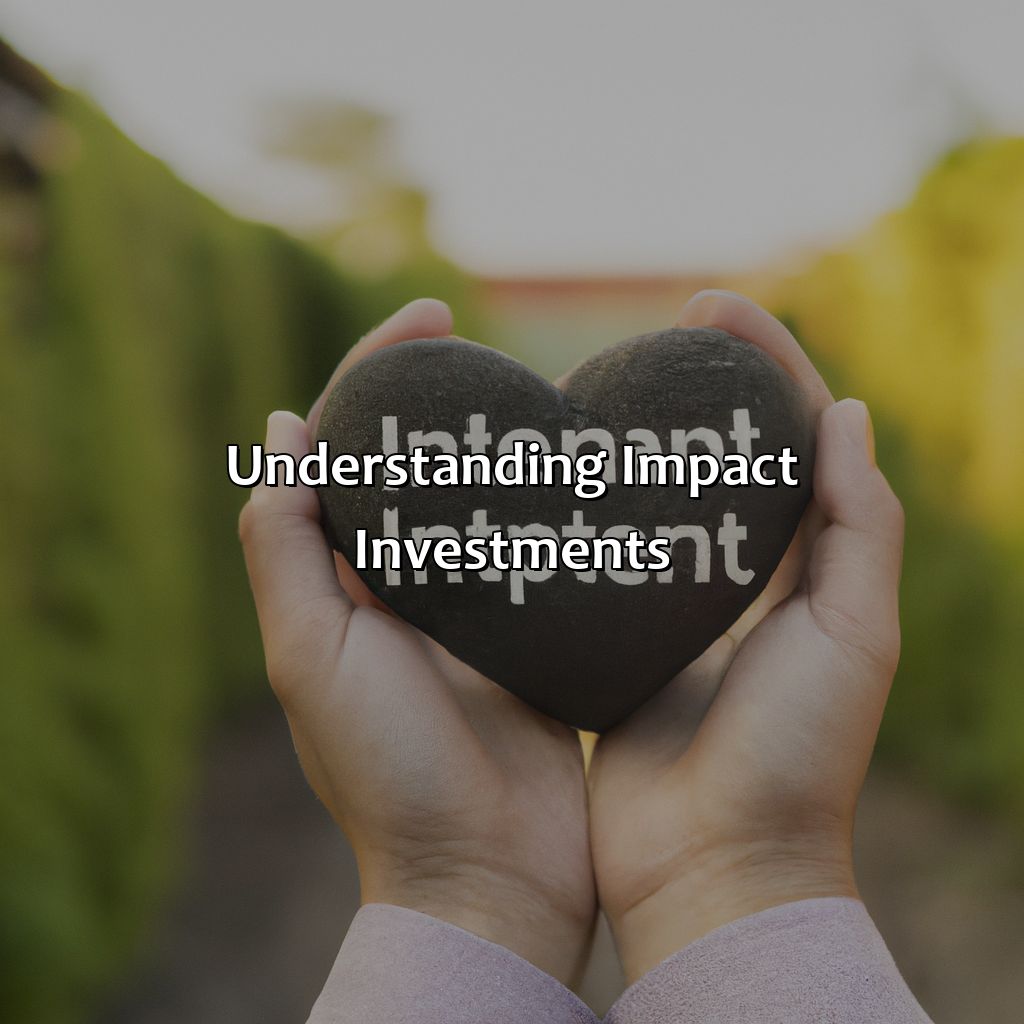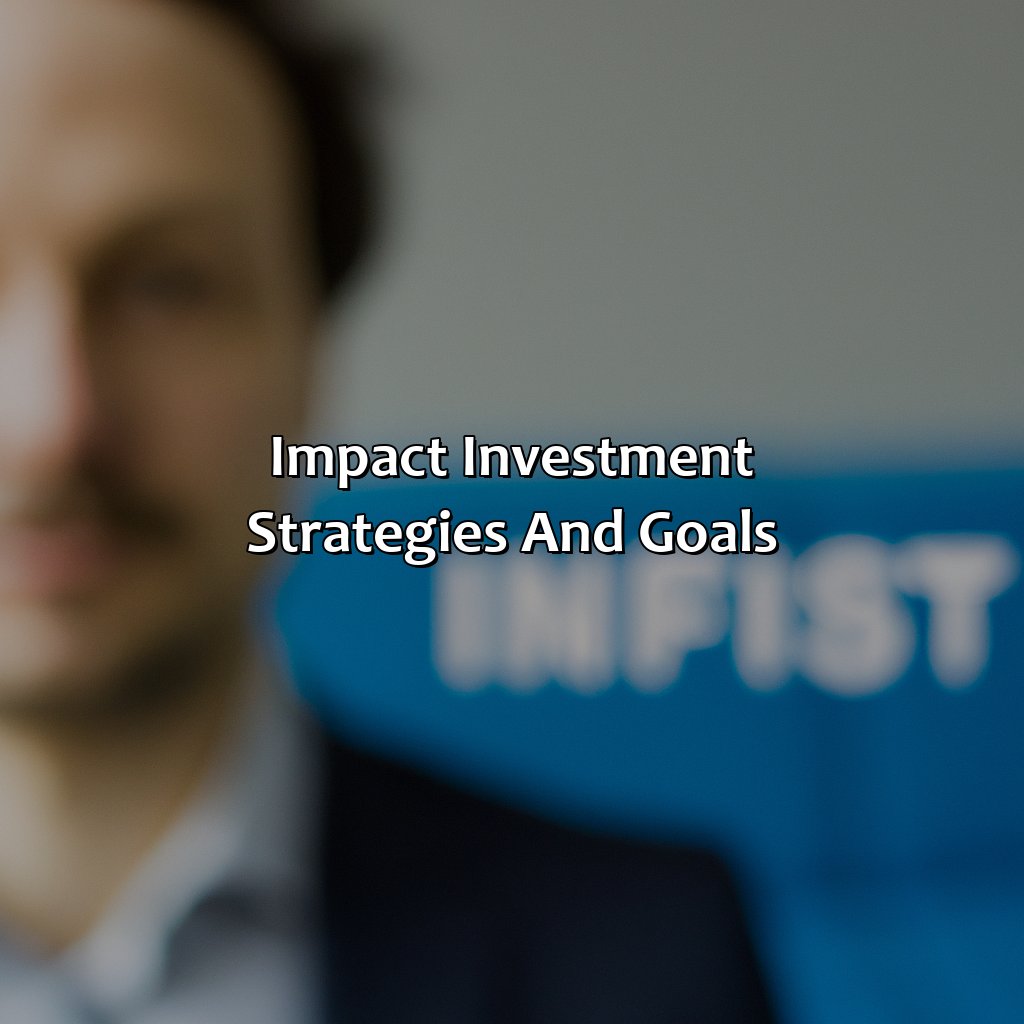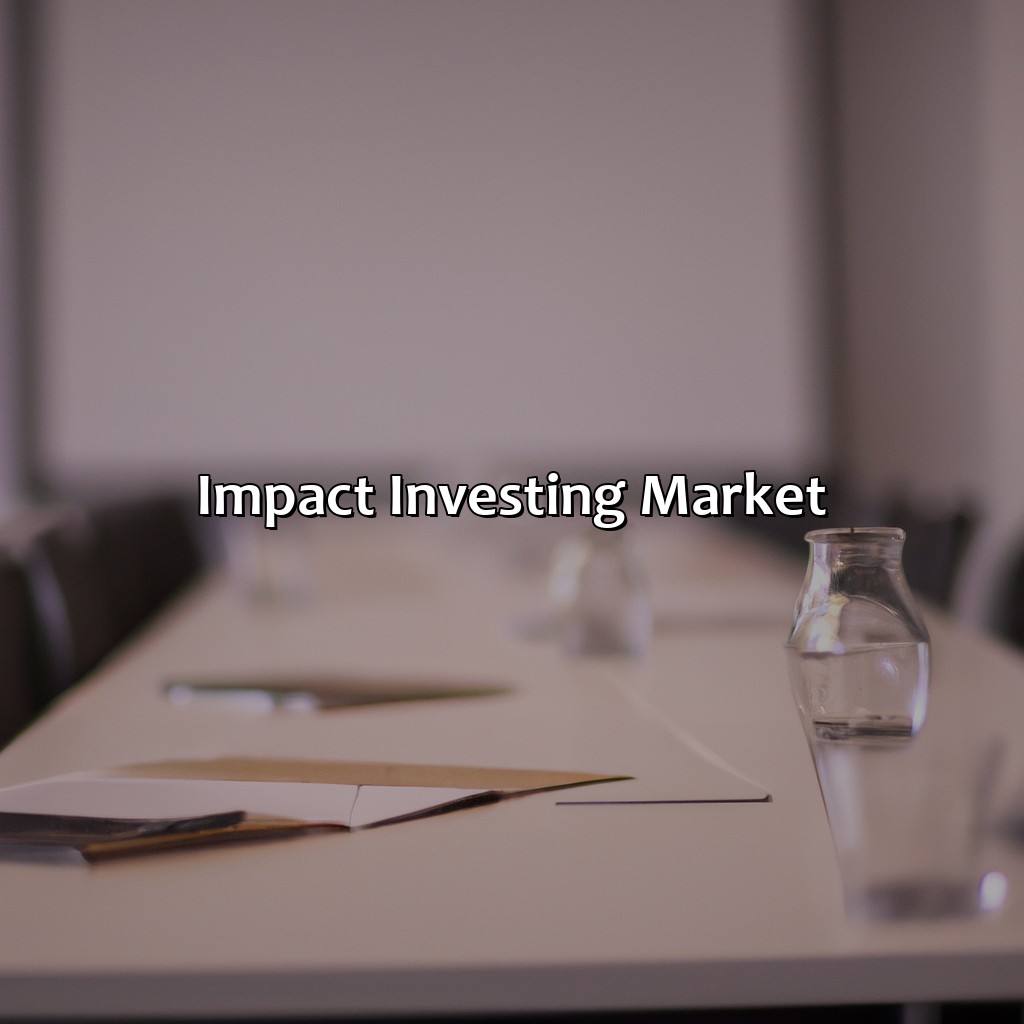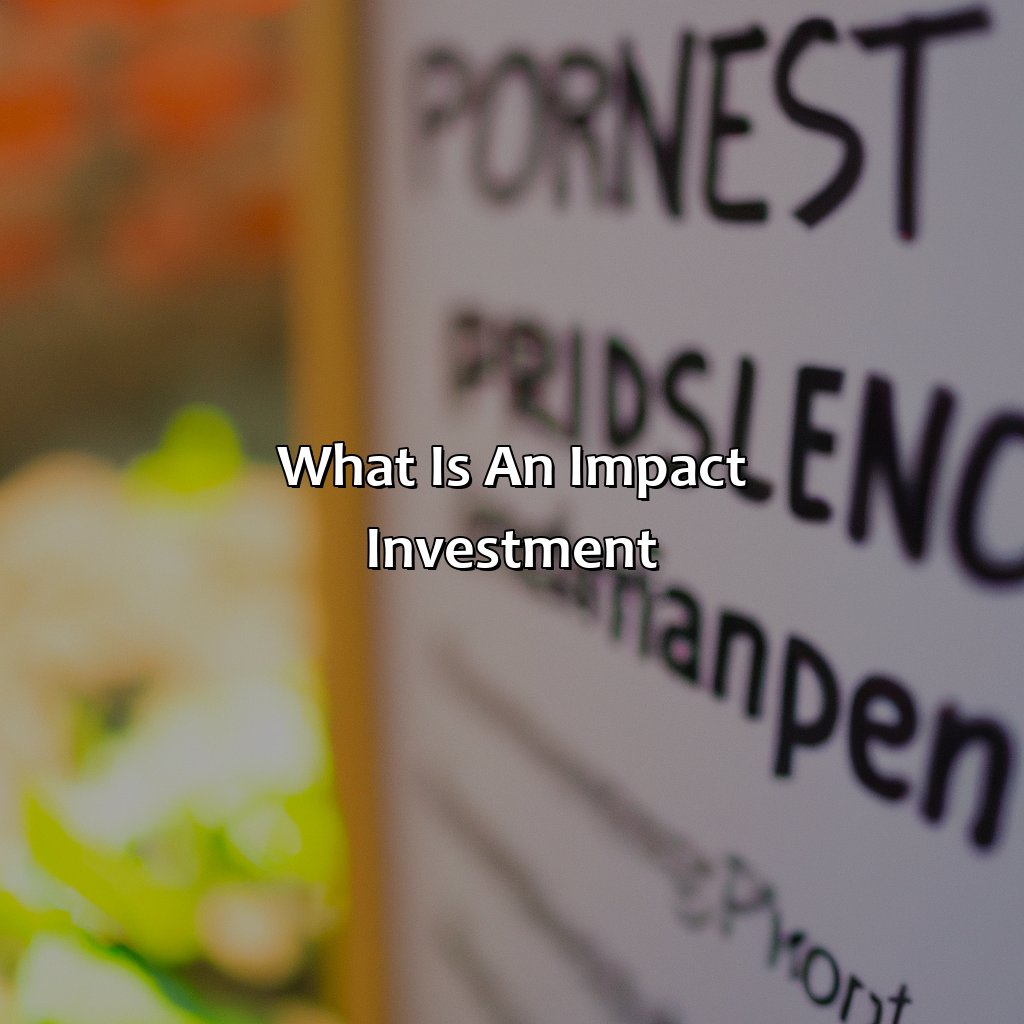What Is An Impact Investment?
Key Takeaway:
- Impact investments are investments made with the intention of generating positive social or environmental impact alongside financial returns. They are made across diverse sectors, such as renewable energy, affordable housing, and sustainable agriculture.
- Impact investment strategies can focus on specific social or environmental issues. Social impact investing addresses social inequalities and aims to improve the quality of life for people, especially the underserved. Environmental impact investing aims to reduce negative environmental impacts and promote sustainable management
- The growth of impact investment market indicates that investors and businesses are increasingly recognizing the importance of addressing social and environmental issues. However, challenges remain, such as a lack of standardized measurement of social and environmental impact, and the need to align with social and environmental goals while still achieving financial returns.
Are you looking for a way to make a positive impact on society while growing your investments? Impact investing may be the answer. You can leverage capital to support companies and initiatives that tackle social and environmental problems. Read this article to find out more.
Understanding Impact Investments
To comprehend impact investments and make judicious choices, you need to familiarize yourself with their definition, qualities, types, and several examples. This section on “Understanding Impact Investments” will furnish you with the necessary data. It includes:
- Definition and Characteristics of Impact Investments,
- Types of Impact Investments, and
- Examples of Impact Investments.

Image credits: retiregenz.com by Harry Arnold
Definition and Characteristics of Impact Investments
Impact investments refer to the financial investments made in companies, organizations or projects that aim to generate measurable, positive social or environmental outcomes alongside financial returns. These investments are gaining popularity among investors and entrepreneurs who are driven by the desire for both profit and social impact.
In essence, an impact investment is about creating a better future for all stakeholders involved in the investment process. The distinct characteristic of an impact investment is its dual focus on both social and financial returns, which makes it different from traditional investing practices. Impact investments include projects related to clean energy, affordable housing, access to education and healthcare services, among others.
Such investments enable investors to contribute meaningfully towards responsible investment practices while also earning decent returns on their holdings. Additionally, impact investing helps create sustainable businesses that operate within ethical boundaries while also addressing societal challenges. Overall, impact investments are transforming global finance with a new wave of capital focused on making a positive impact on society.
Unique details regarding impact investments include rigorous screening criteria that must be met to ensure that organizations and projects align with impactful goals. Investors who make such commitments also expect transparency and accountability throughout the investment process. The integration of social metrics is another aspect of these investments that brings a unique perspective when measuring success beyond mere profitability.
Impact investing has evolved into a mainstream method of financing development objectives worldwide. An exemplary story worth mentioning is Acumen Fund’s engagement with Ziqitza Health Care Limited (ZHL), India’s largest ambulance service provider operating across Asia and Africa. Acumen invested in ZHL not only because it was profitable but because it provided life-saving emergency healthcare services accessible by low-income families.
Overall, impact investing continues to be a transformative force in raising awareness about sustainable business practices which ultimately leads to sustainable development goals being met both locally and globally. Impact investments can range from funding sustainable agriculture to supporting renewable energy initiatives, but let’s be honest, we’re all just hoping to invest in the next big vegan meat alternative.
Types of Impact Investments
Impact investing involves investing in businesses that aim to create a positive social or environmental impact while generating a financial return. Now, moving on to the diverse varieties of investments in this realm:
- Social Investment
- Green Investment
- Community Investment
These investments use different methods to achieve their impact, such as sustainable supply chains or financing clean energy projects. Other types include microfinancing and development finance initiatives.
When focusing on specific industries, we find that health tech startups often receive impact investments for their life-saving innovations that support global public health.
In line with these concepts lies a story about how an impact investment was successful in promoting renewable energy infrastructure in rural communities that were previously unable to access electricity.
Put your money where your heart is and invest in solutions that make a difference – impact investments that save the planet and enhance lives.
Examples of Impact Investments
Impact investing, or investments that strive to make positive social and environmental impacts alongside financial returns, is gaining traction among investors. Here are a few instances of investment types that qualify as impact investments:
- Green Bonds: Issued by institutions like governments or development banks, green bonds are designed to fund environmentally friendly initiatives like renewable energy projects and clean water programs.
- Microfinance: Investing in microfinance allows individuals in underserved communities to access loans and financial services they might not otherwise have access to. This can help kickstart small businesses, improving the livelihoods of those in need.
- Affordable Housing: Impact investments can be used to fund affordable housing projects that provide safe spaces for low-income families to live.
- Sustainable Agriculture: Investing in sustainable agriculture can help eliminate food deserts by supporting small-scale farmers who use environmentally friendly farming methods, providing local communities with fresh produce.
It is important to note that impact investments come in various forms and serve different purposes depending on the individual or organization’s goals.
Let’s be real, impact investment strategies and goals are just fancy ways of saying ‘how to save the world and make money at the same time‘.
Impact Investment Strategies and Goals
To comprehend impact investment strategies and goals, dive into the subsections. These include social impact investing, environmental impact investing, and financial returns in impact investing. Each one presents exclusive ways to invest that fit with your beliefs and stimulate good change.

Image credits: retiregenz.com by Yuval Duncun
Social Impact Investing
Investors who prioritize the positive impact of their investments alongside their financial returns engage in an investment strategy known as Impact Investing. This strategy focuses on social and environmental goals that align with the investor’s values, such as creating sustainable communities or mitigating climate change. By carefully selecting investments that have a measurable, positive impact, impact investors aim to drive systemic change while generating returns.
Impact investment offers an alternative approach to traditional investing by prioritizing measurable impact alongside financial results, rather than focusing solely on returns. Investors actively monitor and measure the outcomes of their investments according to predefined metrics using various evaluation tools. This type of investing spans different asset classes – private equity, fixed income solutions, venture capital and more – catering to various investors’ unique priorities.
While traditional investing seeks only market returns for shareholders, the social impact of impact investing extends beyond profitability towards promoting sustainability and improving socio-economic conditions worldwide.
History shows that Impact Investing has been successful in boosting economic development across emerging markets through microfinance investment projects financed by donors or private equity firms. In addition to protecting ecosystems from deforestation and preserving natural resources, funds from such projects support small businesses and empower women entrepreneurs in developing countries like India and Nigeria. As Impact Investment strategies matured over time, we can expect significant expansion in this sector due to its rising popularity among investors globally.
Why invest in the environment when you could just buy an air freshener for your polluted conscience?
Environmental Impact Investing
Investing in companies or projects that have a positive impact on the environment is known as eco-friendly investing. This type of investment aims to generate both financial and environmental returns. Investors can support sustainable development through green corporate initiatives, renewable energy, and efficient energy use in industry, agriculture and transport.
Eco-friendly investing offers an opportunity to drive environmental change while contributing to long-term financial security. By encouraging businesses to adopt more sustainable practices, investors play an important role in shaping the future of our planet. Sustainable development goals (SDGs) laid out by United Nations are the key driver of such investments globally.
There are different methods of ecological investing such as renewable energy projects, energy-efficient buildings and eco-friendly transportation striving to reduce carbon emissions. These strategies target resources conservation or waste reduction resulting in improved resource efficiency.
Now is the formulating stage for top-tier Environment funds as recent shift "to greener" policies by governments aims at decarbonising economies leading private investors worldwide shifting focus towards it while capturing market opportunity offered by State efforts. Investment opportunities include Green Bonds, ESG Funds targeting Environment indicators or start-ups dealing with Waste Reduction.
Act now – invest with a purpose and create a better world for Future generations while potentially benefiting from financially rewarding opportunities! Who says you can’t save the world and make a profit? Impact investing proves that doing good can also mean doing well financially.
Financial Returns in Impact Investing
An overview of the financial returns expected by impact investment prospects in a transformative manner. These investments achieve goals beyond customary financial profits, and their profitability is assessed through innovative standards. By developing realistic expectations, investors can generate capital while providing positive influence on society and environment.
Impact investing results show that financial gains can be achieved alongside societal benefits. Investors are demanding to build a comprehensive framework for assessing the social and monetary effectiveness of these investments. The lower yield of impact investment was justified with the intention to make a difference in societal issues that require attention. Nevertheless, strong returns on investment have been made possible by well-structured opportunities with risk-reward balance.
This article is dedicated to informing readers about effective investment strategies for achieving social or environmental objectives alongside profitable financial income streams. The goal is to encourage potential investors to give back by allocating resources in meaningful ways that provide both social benefit and sound monetary gains.
A socially active entrepreneur hailing from New York established an award-winning enterprise providing disability care services within disadvantaged minority communities at scale via investment funding, enabling them access to affordable healthcare facilities while profiting as per-market rates paving way for necessary infrastructure benefiting community sustainability including job creation prospectives and better quality living standard.
When it comes to impact investing, the market is hotter than the ghost pepper challenge at a frat party.
Impact Investing Market
Know the Impact Investing Market? You must be aware of the Growth and Trends, Challenges and Risks, and Future of Impact Investing. These sub-sections offer a unique view of the market. It’s an exciting field to invest in!

Image credits: retiregenz.com by James Arnold
Growth and Trends in Impact Investing
The impact investing market is seeing a significant rise in capital investments seeking both financial returns and positive social outcomes. The trends suggest that investors are eager to align their values with their investment portfolios, driving the growth of ESG-oriented (environmental, social, governance) investments.
Moreover, the industry is witnessing a significant acceleration towards the adoption of sustainable development goals, leading to widespread usage of impact metrics and frameworks such as GIIN’s IRIS+. Investors’ primary focus is now on issues such as climate change, healthcare, education, and social inequality.
In recent years, more institutional investors, such as pension funds and endowments, have recognized that integrating ESG factors into their portfolios enhances returns over time. Private equity firms also increasingly view ESG as an opportunity for value creation.
According to the Global Impact Investing Network (GIIN), assets invested in impact strategies doubled between 2017 and 2019 to reach a total estimated valuation of $715 billion globally.
Putting your money where your heart is can be a risky business, but the impact investing market proves that high returns and high ethical standards can coexist.
Challenges and Risks in Impact Investing
The intricacies and risks of impact investing can pose unique challenges to investors seeking to engage in sustainable funding. Factors such as uncertain returns, difficulties in measuring social and environmental impact, and assessing the financial viability of ventures can all affect portfolio performance. Despite such complexities, opportunities for profit and positive impact make the market attractive.
Investors must perform comprehensive due diligence before committing capital to an impact enterprise. Fund managers should be able to prove that their portfolio companies have a clear plan for achieving sustainability beyond their initial investment round. A lack of transparency or ethical concerns regarding a venture’s current or former operations can damage a firm’s reputation and bottom line.
It is important for investors not to be solely motivated by social benefit when making investment decisions, as the market still requires rigorous financial analysis. Proper appreciation of both qualitative and quantitative factors will allow investors to identify opportunities with solid potential for returns as well as an ability to make positive social contributions.
A charitable foundation initially invested millions into a company specializing in renewable energy infrastructure. The firm encountered setbacks after political turmoil destabilized their primary location of operations; However, due to impeccable strategic planning, they were able to pivot toward international expansion plans timed perfectly with increasing global demand for renewable tech solutions- delivering profits while continuing their commendable efforts towards carbon neutrality.
Let’s hope the future of impact investing is brighter than our current climate forecast.
Future of Impact Investing
Impact Investing is rapidly becoming an acceptable investment avenue for investors looking to create a positive change in society and the environment. The shift towards ethical investments and sustainable development goals is driving the growth of this market.
As we move towards the Future of Impact Investing, we see increased collaboration between different sectors such as governments, corporates, and NGOs. Technology-based solutions and data-driven evaluation tools are being developed to quantify social and environmental impact, making it easier for investors to measure their returns. Sustainable growth startups also offer attractive returns on investment in addition to social and environmental benefits.
In this fast-growing market, transparency regarding the use of funds is key to maintaining investor confidence. Through responsible investing practices, impact investments will continue to have a positive impact around the world.
Pro Tip: Aspiring impact investors should carefully evaluate opportunities based on potential social and environmental returns while considering financial risk.
Move over Wall Street wolves, Impact Investing players have arrived to save the world and make a profit while doing it.
Impact Investing Players
Explore the world of impact investing! Look into Impact Investing Funds, Organizations, and Individuals. Uncover their individual contributions to social good. See how their different strategies assist you in finding the right impact investing opportunities.

Image credits: retiregenz.com by James Jones
Impact Investing Funds
Investments made with a goal of creating a positive impact on society or the environment are known as impact investments. These investments aim to provide financial returns along with a social impact. Impact investing funds have gained popularity in recent years, and attract investors who seek both financial gains and societal benefits.
Impact investing funds primarily invest in companies that are committed towards ethical practices, environmental sustainability, and social responsibility. These funds enable investors to contribute towards creating a better world while also generating profits.
Moreover, these funds can also have specific focus areas such as gender equality, renewable energy, healthcare, education or affordable housing. By investing in such areas, investors can support and promote businesses that have positive social impact which aligns with their interests.
Investors should consider partnering with a trusted investment advisor to understand risk-return profiles of impact investing funds which suit their investment goals. It is significant for investors seeking to achieve financial and non-financial returns to participate in this growing market of impact investments.
Don’t miss out on the chance to contribute positively towards society while reaping the benefits of smart investment choices; explore the world of impact investing today!
Making a difference has never been more profitable- these impact investing organizations prove that you can do good while making bank.
Impact Investing Organizations
Investment firms focused on generating positive social or environmental impact alongside financial returns are referred to as Impact Investing players. These organizations employ strategies designed to achieve specific goals such as socioeconomic development, climate change mitigation & adaptation, and improving access to education, healthcare & sustainable resources. Impact Investing Players invest in companies with high potential for delivering measurable and meaningful returns through products, services, and solutions that address global sustainability challenges.
They also use a range of metrics to evaluate the effectiveness of their investments ranging from Environmental Social Governance (ESG) criteria that assesses the ethical practices of companies they invest in, UN Sustainable Development Goals (SDGs), which identify objectives addressing global issues including poverty alleviation, gender equality and sustainability. Additionally, these investors work closely with their portfolio companies to create new social and environmental targets aligned with their goals.
The concept of impact investing has been around since the 1960s when socially responsible investing began gaining popularity among certain groups wanting to avoid investing in companies that operated in industries like tobacco or weapons. In the years following the 2008 financial crisis, interest in impact investing grew exponentially as institutional investors searched for ways to mitigate risk by diversifying portfolios with ventures offering clear societal benefits while also delivering healthy financial returns.
Who needs a cape and superpowers when you can be an impact investing individual, saving the world one investment at a time?
Impact Investing Individuals
Investors who seek to create a positive social or environmental impact while generating financial returns are defined as Impact Investing Individuals. By identifying and engaging with companies that prioritise sustainability and ethical practices, they contribute to creating a more equitable society and protect the planet’s future.
Impact Investment Individuals also consider relevant stakeholders’ perspectives, including employees, customers, suppliers and communities where they operate. They attempt to create shared value by addressing societal needs through their investments.
It is important for Impact Investment Individuals to conduct extensive research and due diligence while selecting investment opportunities with quantifiable social or environmental outcomes. They must measure their success by tracking their investments’ impact in terms of both financial returns and social impact.
Begin your journey towards becoming an Impact Investment Individual today and make a difference in the world through the power of your investments. Start small or dive right in, but don’t miss out on this unique opportunity to generate wealth while creating real change.
Some Facts About Impact Investments:
Impact investments are investments made in projects, companies or organizations with the intention of generating social or environmental impact alongside financial returns. (Source: The Balance)
The global impact investing market is estimated to be worth between $715 billion and $1 trillion, and is growing rapidly. (Source: Global Impact Investing Network)
Impact investments can be made in a variety of sectors, including agriculture, education, energy, healthcare, and affordable housing. (Source: Impact Enterprise Alliance)
Impact investors use a range of metrics to measure the societal and environmental impact of their investments, such as the United Nations’ Sustainable Development Goals. (Source: Forbes)
Impact investments can have a range of positive outcomes, including poverty reduction, job creation, and the development of sustainable business practices. (Source: Harvard Business Review)
FAQs about What Is An Impact Investment?
What is an impact investment?
An impact investment is an investment made with the intention of generating a measurable social or environmental impact alongside a financial return.
How is an impact investment different from a traditional investment?
An impact investment differs from a traditional investment because it is made with the intention of generating a positive social or environmental impact alongside financial returns, whereas traditional investments prioritize financial returns above all else.
What types of organizations are typically targeted for impact investments?
Impact investments can be made in a wide range of organizations, including social enterprises, non-profits, and for-profit companies that are committed to creating positive social or environmental change.
What are some examples of impact investments?
Some examples of impact investments include investments in renewable energy projects, affordable housing initiatives, education and healthcare programs, and microfinance institutions.
What are the benefits of making an impact investment?
The benefits of making an impact investment include the potential to create positive social or environmental change while also generating financial returns, as well as the satisfaction of knowing that your investment is making a difference in the world.
What should I consider before making an impact investment?
Before making an impact investment, it is important to carefully consider the social or environmental impact that your investment will have, as well as the financial risks and potential returns. It is also important to work with reputable impact investment organizations that have a track record of success in this area.
 Checkout this IRS Loophole
Checkout this IRS Loophole 
